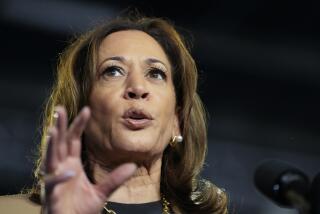Cheney’s Health: Legitimate Issue
- Share via
George W. Bush, who now regards himself as the president-elect, has named Dick Cheney, his vice presidential running mate, to oversee the transition that he expects to usher in a new Republican administration. Cheney, with his extensive Washington experience, is a sound choice. But as the nation now has been reminded, he is also a man with a worrisome health history, the details of which Cheney has zealously guarded. Given that history, legitimate questions are being asked about his ability to cope with the stresses of high office.
Cheney has had four heart attacks--the most recent last week--and in 1988 underwent quadruple bypass surgery. His doctors say that Cheney should be able to carry out official duties. Other cardiologists aren’t so sure. The fact is that too little is known about the health of a man who, as a potential vice president, automatically becomes a potential president. That is deeply troubling.
Secretiveness about Cheney’s health didn’t end with his refusal to release relevant details during the campaign. It was also in evidence last Wednesday, when Bush assured the nation that Cheney had not suffered a heart attack. Even as Bush was speaking, Cheney’s doctors, after diagnosing a “mild” heart attack, were carrying out a procedure to open up a seriously clogged artery. Did Bush deliberately and foolishly try to mislead? Karen Hughes, his press secretary, later said she knew about the surgery but hadn’t bothered to tell Bush. If true, that is an alarming insight into how the flow of essential information is controlled in the Bush camp.
Presidents, or their doctors or families, often hide the truth about health problems that could affect how they carry out their duties. The public knew nothing about the onset of Ronald Reagan’s Alzheimer’s disease near the end of his presidency. The Addison’s disease that John F. Kennedy suffered was regarded as a virtual state secret. Franklin D. Roosevelt’s doctors knew he was dying from heart disease even as he ran for a fourth term in 1944, but they didn’t tell even the president or his family. The never-acknowledged breakdown in Woodrow Wilson’s health late in his second term left his presidency in the hands of unelected surrogates.
Precisely because experience shows clearly that presidents tend to hide or minimize serious health problems, it’s right to insist, before they are elected, that all presidential and vice presidential candidates disclose whatever medical information might be relevant to their ability to serve. To wait until a possibly foreseeable problem actually manifests itself is not a sound alternative.
More to Read
Get the L.A. Times Politics newsletter
Deeply reported insights into legislation, politics and policy from Sacramento, Washington and beyond. In your inbox three times per week.
You may occasionally receive promotional content from the Los Angeles Times.










